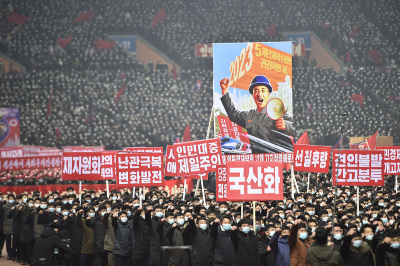We can't ignore the suffering of Christians in North Korea

“Life for Christians in North Korea [is] a constant cauldron of pressure; capture or death is only a mistake away.” As cited by the 2022 State Department report, this is the daily reality for Christians in North Korea.
The U.S. Commission on International Religious Freedom (USCIRF) was the latest to sound that alarm, documenting the testimonies of several North Korean defectors on the horrific experiences of Christians and other religious adherents in prison. One defector testified of a Christian prisoner who would pray daily and was then punished with extreme beatings with clubs or boots: “One time they beat [the Christian prisoner] to the brink of death, leaving the person bleeding on the ground. But this person got up and prayed just the same the next morning.” After being beaten, the man was cursed at by Ministry of State Security officials and told “he should just drop dead.” This torture lasted for 15 years in the political prisoner camp.
Another prisoner was arrested for smuggling a Bible from China. The prisoner was put into solitary confinement, which the testifier said was the “scariest room in the facility,” and he was likely to be executed. Every two hours during patrol, correctional officers would strike the prisoner’s hands with a metal rod “mercilessly,” screeching that the prisoner’s actions harmed “comrade Kim Il Sung’s ideology.” The prisoner also only received one meal per day of one serving of “bloated corn kernels boiled into a muck.” Others were tortured in several ways, including deprivation of food and water, deprivation of sleep, physical and verbal abuse, forced nudity, and positional torture, where a prisoner was forced to stay in a fixed position for long periods of time. According to a 2021 report by the nonprofit Korea Future, “the campaign to exterminate all Christian adherents and institutions has been brutally effective.”
Now, in a recent report by Hudson Institute, Hudson Institute Senior Fellow Olivia Enos believes that North Korea may be committing genocide against Christians, and the U.S. government needs to investigate this possibility. Enos argues that the U.S. government needs to issue an atrocity determination to continue what the United Nation’s 2014 Commission of Inquiry (COI). The COI brought attention to the issue and outlined the “crimes against humanity” that North Korea had committed, but it did not point out the genocidal activity of the state.
The 1948 Genocide Convention focused on groups targeted for elimination because of nationality, race, ethnicity, or religion. Yet, the North Korean regime’s attacks on Christians and other religious adherents are motivated primarily by politics. Reports find that Christians are targeted because of their historical role in leading efforts to overthrow communist leaders, their refusal to worship the Kim regime, and the belief that Christians are influenced by the U.S. and South Korea. Nevertheless, as Enos points out, Christians in the state experience much of the cruelty described in the definition merely for their religious status, particularly the acts of killing, administering serious bodily or mental harm, and targeting children.
Enos points to the political momentum generated by the COI to argue for a renewed response. Only two years after its release, the COI prompted the U.S. to expand sanctions against North Korea through the Treasury Department, then through two different laws that imposed sanctions for goods produced with forced labor and tied the relief of sanctions to improving human rights. South Korea also made legal and political commitments to promoting North Korean human rights two years after the report’s release. Lastly, the U.N. discussed North Korean human rights for the first time after the report’s release, and it established a U.N. office in Seoul.
Enos argues that a similar response by the U.S. would again spark momentum on the issue. Not only is this important for human rights, but a response would align with American strategic interests. Security and human rights issues in North Korea are interconnected: North Korea’s exploitation of its people allows it to stay in power — and to grow its resources and weapons programs.
A response from the U.S. government could be pivotal to addressing the suffering of persecuted Christians in North Korea. With the situation for North Korean Christians becoming increasingly dire, it is even more pertinent for the Biden administration to take action.
Originally published at The Washington Times.
Abigail Ferrara is an intern at Family Research Council.



























